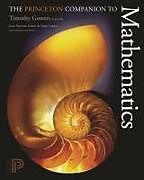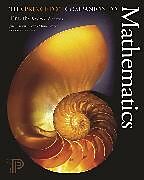Princeton Companion to Mathematics
Einband:
Fester Einband
EAN:
9780691118802
Untertitel:
Englisch
Autor:
Timothy Gowers
Herausgeber:
Princeton Univers. Press
Anzahl Seiten:
1034
Erscheinungsdatum:
30.11.2008
ISBN:
0691118809
Presents two hundred entries that introduce basic mathematical tools and vocabulary. This title traces the development of modern mathematics. It explains essential terms and concepts; examines core ideas in major areas of mathematics; and describes the achievements of scores of famous mathematicians.
"I'm completely charmed. This is one of those books that makes you wish you had a desert island to be marooned on."---Brian Hayes, bit-player.org
Autorentext
Timothy Gowers is a Fields Medal–winning British mathematician. A professor at the Collège de France, he also teaches at the University of Cambridge and is the author of Mathematics: A Very Short Introduction. June Barrow-Green is professor of the history of mathematics at the Open University. Imre Leader is professor of pure mathematics at the University of Cambridge.
Klappentext
"This is a wonderful book. The content is overwhelming. Every practicing mathematician, everyone who uses mathematics, and everyone who is interested in mathematics must have a copy of their own."--Simon A. Levin, Princeton University"The Princeton Companion to Mathematics fills a vital need. It is the only book of its kind."--Victor J. Katz, professor emeritus, University of the District of Columbia"I think that this is a wonderful book, completely different from anything that has been written before about mathematics and mathematicians."--Endre Süli, University of Oxford"The Princeton Companion to Mathematics is a much needed--and will become a much used--reference work. In fact, it will stand alone as the reference work in mathematics."--John J. Watkins, Colorado College
Zusammenfassung
The ultimate mathematics reference book
This is a one-of-a-kind reference for anyone with a serious interest in mathematics. Edited by Timothy Gowers, a recipient of the Fields Medal, it presents nearly two hundred entries—written especially for this book by some of the world's leading mathematicians—that introduce basic mathematical tools and vocabulary; trace the development of modern mathematics; explain essential terms and concepts; examine core ideas in major areas of mathematics; describe the achievements of scores of famous mathematicians; explore the impact of mathematics on other disciplines such as biology, finance, and music—and much, much more.
Unparalleled in its depth of coverage, The Princeton Companion to Mathematics surveys the most active and exciting branches of pure mathematics. Accessible in style, this is an indispensable resource for undergraduate and graduate students in mathematics as well as for researchers and scholars seeking to understand areas outside their specialties.
Features nearly 200 entries, organized thematically and written by an international team of distinguished contributorsPresents major ideas and branches of pure mathematics in a clear, accessible styleDefines and explains important mathematical concepts, methods, theorems, and open problemsIntroduces the language of mathematics and the goals of mathematical researchCovers number theory, algebra, analysis, geometry, logic, probability, and moreTraces the history and development of modern mathematicsProfiles more than ninety-five mathematicians who influenced those working todayExplores the influence of mathematics on other disciplinesIncludes bibliographies, cross-references, and a comprehensive indexContributors include:
Graham Allan, Noga Alon, George Andrews, Tom Archibald, Sir Michael Atiyah, David Aubin, Joan Bagaria, Keith Ball, June Barrow-Green, Alan Beardon, David D. Ben-Zvi, Vitaly Bergelson, Nicholas Bingham, Béla Bollobás, Henk Bos, Bodil Branner, Martin R. Bridson, John P. Burgess, Kevin Buzzard, Peter J. Cameron, Jean-Luc Chabert, Eugenia Cheng, Clifford C. Cocks, Alain Connes, Leo Corry, Wolfgang Coy, Tony Crilly, Serafina Cuomo, Mihalis Dafermos, Partha Dasgupta, Ingrid Daubechies, Joseph W. Dauben, John W. Dawson Jr., Francois de Gandt, Persi Diaconis, Jordan S. Ellenberg, Lawrence C. Evans, Florence Fasanelli, Anita Burdman Feferman, Solomon Feferman, Charles Fefferman, Della Fenster, José Ferreirós, David Fisher, Terry Gannon, A. Gardiner, Charles C. Gillispie, Oded Goldreich, Catherine Goldstein, Fernando Q. Gouvêa, Timothy Gowers, Andrew Granville, Ivor Grattan-Guinness, Jeremy Gray, Ben Green, Ian Grojnowski, Niccolò Guicciardini, Michael Harris, Ulf Hashagen, Nigel Higson, Andrew Hodges, F. E. A. Johnson, Mark Joshi, Kiran S. Kedlaya, Frank Kelly, Sergiu Klainerman, Jon Kleinberg, Israel Kleiner, Jacek Klinowski, Eberhard Knobloch, János Kollár, T. W. Körner, Michael Krivelevich, Peter D. Lax, Imre Leader, Jean-François Le Gall, W. B. R. Lickorish, Martin W. Liebeck, Jesper Lützen, Des MacHale, Alan L. Mackay, Shahn Majid, Lech Maligranda, David Marker, Jean Mawhin, Barry Mazur, Dusa McDuff, Colin McLarty, Bojan Mohar, Peter M. Neumann, Catherine Nolan, James Norris, Brian Osserman, Richard S. Palais, Marco Panza, Karen Hunger Parshall, Gabriel P. Paternain, Jeanne Peiffer, Carl Pomerance, Helmut Pulte, Bruce Reed, Michael C. Reed, Adrian Rice, Eleanor Robson, Igor Rodnianski, John Roe, Mark Ronan, Edward Sandifer, Tilman Sauer, Norbert Schappacher, Andrzej Schinzel, Erhard Scholz, Reinhard Siegmund-Schultze, Gordon Slade, David J. Spiegelhalter, Jacqueline Stedall, Arild Stubhaug, Madhu Sudan, Terence Tao, Jamie Tappenden, C. H. Taubes, Rüdiger Thiele, Burt Totaro, Lloyd N. Trefethen, Dirk van Dalen, Richard Weber, Dominic Welsh, Avi Wigderson, Herbert Wilf, David Wilkins, B. Yandell, Eric Zaslow, and Doron Zeilberger
Inhalt
Preface ix Contributors xvii Part I Introduction I.1 What Is Mathematics About? 1 I.2 The Language and Grammar of Mathematics 8 I.3 Some Fundamental Mathematical Definitions 16 I.4 The General Goals of Mathematical Research 48 Part II The Origins of Modern Mathematics II.1 From Numbers to Number Systems 77 II.2 Geometry 83 II.3 The Development of Abstract Algebra 95 II.4 Algorithms 106 II.5 The Development of Rigor in Mathematical Analysis 117 II.6 The Development of the Idea of Proof 129 II.7 The Crisis in the Foundations of Mathematics 142 Part III Mathematical Concepts III.1 The Axiom of Choice 157 III.2 The Axiom of Determinacy 159 III.3 Bayesian Analysis 159 III.4 Braid Groups 160 III.5 Buildings 161 III.6 Calabi-Yau Manifolds 163 III.7 Cardinals 165 III.8 Categories 165 III.9 Compactness and Compactification 167 III.10 Computational Complexity Classes 169 III.11 Countable and Uncountable Sets 170 III.12 C*-Algebras 172 III.13 Curvature 172 III.14 Designs 172 III.15 Determinants 174 III.16 Differential Forms and Integration 175 III.17 Dimension 180 III.18 Distributions 184 III.19 Duality 187 III.20 Dynamical Systems and Chaos 190 III.21 Elliptic Curves 190 III.22 The Euclidean Algorithm and Continued Fractions 191 III.23 The Euler and Navier-Stokes Equations 193 III.24 Expanders 196 III.25 The Exponential and Logarithmic Functions 199 III.26 The Fast Fourier Transform 202 III.27 The Fourier Transform 204 III.28 Fuchsian Groups 208 III.29 Function Spaces 210 III.30 Galois Groups 213 III.31 The Gamma Function 213 III.32 Generating Functions 214 III.33 Genus 215 III.34 Graphs 215 III.35 Hamiltonians 215 III.36 The Heat Equation 216 III.37 Hilbert Spaces 219 III.38 Homology and Cohomology 221 III.39 Homotopy Groups 221 III.40 The Ideal Class Group 221 III.41 Irrational and Transcendental Numbers 222 III.42 The Ising Model 223 III.43 Jordan Normal Form 223 III.44 Knot Polynomials 225 III.45 K-Theory 227 III.46 The Leech Lattice 227 III.47 L-Functions 228 III.48 Lie Theory 229 III.49 Linear and Nonlinear Waves and Solitons 234 …

Leider konnten wir für diesen Artikel keine Preise ermitteln ...
billigbuch.ch sucht jetzt für Sie die besten Angebote ...
Die aktuellen Verkaufspreise von 6 Onlineshops werden in Realtime abgefragt.
Sie können das gewünschte Produkt anschliessend direkt beim Anbieter Ihrer Wahl bestellen.
Loading...
Die aktuellen Verkaufspreise von 6 Onlineshops werden in Realtime abgefragt.
Sie können das gewünschte Produkt anschliessend direkt beim Anbieter Ihrer Wahl bestellen.
| # | Onlineshop | Preis CHF | Versand CHF | Total CHF | ||
|---|---|---|---|---|---|---|
| 1 | Seller | 0.00 | 0.00 | 0.00 |
